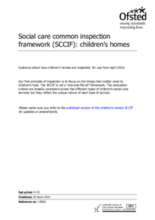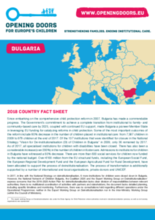Displaying 491 - 500 of 1510
In this article, the authors provide children’s insights into their own life experiences and individual identities. The data was collected during an ethnographic research in one of Estonia’s SOS Children’s Villages (SOS CV).
This theoretical-empirical study is based on two particular case studies of families bringing up children from institutional care in Slovakia.
This video from 1MillionHome shares the story of one children's home in Kenya, Agape, that transitioned from a "traditional orphanage" to a family reunification center.
This study investigated the relationship between familial residential school system (RSS) exposure and personal child welfare system (CWS) involvement among young people who use drugs (PWUD).
In this study, the authors examined adolescents' emotional security and insecurity (preoccupation and disengagement) determined by dimensions of interparental conflict (IPC). These results have implications for researchers and for practitioners when addressing family reunification for adolescents in residential care (RC) or risks in community samples.
This inspection framework, developed by the UK's Office for Standards in Education, Children's Services and Skills (Ofsted), provides guidance about how children’s homes are inspected, for use from April 2019.
This article focuses on the “zero-tolerance” policy adopted in spring, 2018, in the USA. The implementation of this policy resulted in the forced separation of children from their families and the violation of human rights of those detained in authorized facilities and foster care.
This book offers a comprehensive overview of the newest contributions to the literature on leaving care in relation to theory, in addition to the Theory of Emerging Adulthood, while also featuring cutting-edge research and best practices that support adjustment across a range of domains for this population.
This study aims to analyze the comparative effectiveness of Youth Self-Report (YSR) and the Strengths and Difficulties Questionnaire (SDQ) as screening tools of psychological (mal)adjustment, looking for differences in the way psychological problems and difficulties are identified by these two measures in adolescents in residential care (RC).
This factsheet highlights the developments and challenges still ahead in Bulgaria and offers key recommendations to the EU and the national government to ensure that children are cared for in family-based settings.


